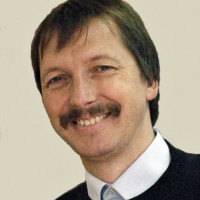Thomas Henning to Present Marker Lectures in Astronomy and Astrophysics on 20, 21, and 22 October 2014

Thomas Henning, director of the Planet and Star Formation Department at the Max Planck Institute for Astronomy in Heidelberg, Germany, will present the Russell Marker Lectures in Astronomy and Astrophysics on 20, 21, and 22 October, 2014, at the Penn State University Park Campus. The lecture series includes a presentation intended for a general audience, “Extrasolar Planets, Blue Dots, and the Origin of Life,” which will be held at 7:00 p.m. on Tuesday, 21 October, in 101 Thomas Building. In this lecture, Henning will describe discoveries of planets beyond our solar system and properties of protoplanetary disks — the cradles of planet formation. He also will discuss the connection between astronomical discoveries and our understanding of the origin of life on Earth. In addition to this public lecture, Henning will give two specialized lectures on 20 and 22 October in 538 Davey Laboratory. Both of these lectures will be held at 3:45 p.m. The Marker Lectures are sponsored by the Penn State Eberly College of Science.
Henning is the director of the Planet and Star Formation Department at the Max Planck Institute for Astronomy. He also is an Honorary Professor of Astronomy at the University of Heidelberg and a Professor for Astrophysics at the University of Jena, Germany. Henning received his Ph.D. in astrophysics from the University of Jena. He worked as a postdoctoral fellow at Charles University in Prague, Czech Republic and at the Max Planck Institute for Radio Astronomy in Bonn, Germany. He then returned to the University of Jena. In 2001, he was appointed as Scientific Member of the Max Planck Society and Director at the Max Planck Institute for Astronomy.
Henning is a leading expert in the field of protoplanetary disks and planet formation, the early formation stages of stars and stellar clusters, astrochemistry, and laboratory astrophysics. He is a co-principal investigator of a number of space-based and ground-based astronomical instruments, including the new planet finder SPHERE for the Very Large Telescope and the MIRI instrument for the James Webb Space Telescope. He also serves on numerous panels and advisory groups, including the European Southern Observatory Council and the European Research Council. Henning is a member of the German National Academy of Science Leopoldina. The minor planet Tomhenning in our solar system’s main asteroid belt has been named in his honor.
The Marker Lectures were established in 1984 through a gift from Penn State Professor Emeritus of Chemistry Russell Earl Marker, whose pioneering synthetic methods revolutionized the steroid-hormone industry and opened the door to the current era of hormone therapies, including the birth-control pill. The Marker endowment allows the Penn State Eberly College of Science to present annual Marker Lectures in astronomy and astrophysics, the chemical sciences, evolutionary biology, genetic engineering, the mathematical sciences, and physics.
For more information, contact Donald Schneider at 814-863-9554 or dps7@psu.edu, Peter Meszaros at nnp@psu.edu, or Alex Wolszczan at alex@astro.psu.edu. For access assistance, contact Laurie Dasher at 814-865-0418 or lad31@psu.edu.




